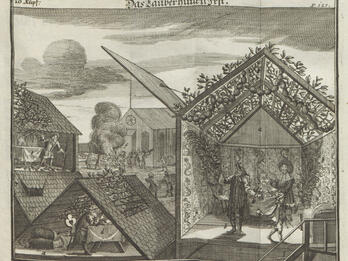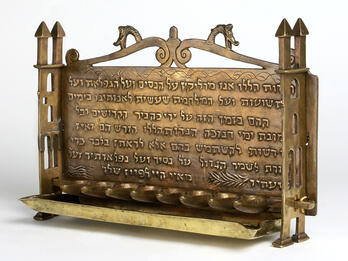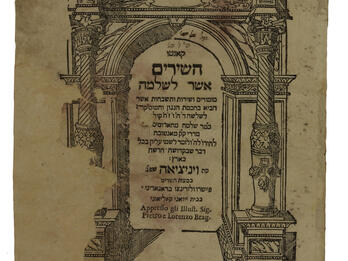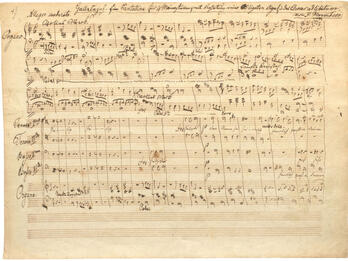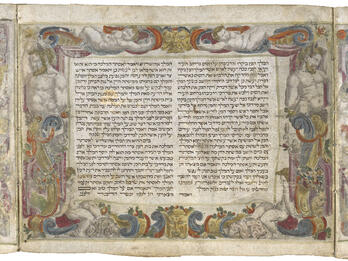Introduction: Salamone de Rossi’s Ha-shirim asher li-Shelomoh (The Songs of Solomon)
Leon (“Judah Aryeh of”) Modena, son of the honored rabbi Isaac (may his memory be blessed!), To every ear that tests words, peace!
May the language of truth be established forever, or as the poet [Immanuel Haromi] said in his “Notebooks”: “What will the science of music [niggun] say to others? ‘I was stolen, yes stolen from the land of the Hebrews.”’ Sages sprouted like grass in all studies in ancient Israel—because of them all lofty sciences flourished; they won the honor and respect of the nations, rising on wings like eagles. As one of them [the sciences], it [music], too, was not absent from them [the sages] in its perfection; it was taken from them as from a man. Who could forget or fail to remember the efforts of old King David in providing, beforehand, orderly instruction in the rudiments of song [shir] for all the sons of Asaph, Heman and Jeduthun, as written in the [first] book of Chronicles [25:1], to make them understand how to produce sounds? He allowed them to have instruments for use in instrumental music [zimra demana] and vocal music [zimra defuma]. Such was their practice for as long as the House of the Lord remained on its site as the First and Second Temples and He favored its continuation as a cover for sanctity. Yet the events of our foreign dwellings and of our restless runnings are dispersed over the lands and the vicissitudes of life abroad were enough to make them [the Hebrews] forget all knowledge and lose all intellect. For the wrath of the Lord was upon the people; and He afflicted and besotted them and made them wander into a pit empty of all understanding. Moreover, when they were in a land not of their own, the wisdom of their sages disappeared. Still, their ears picked up a trace of it afterwards from their neighbors, as the remnant of the city [Jerusalem] in these generations at the end of time.
Let them praise the name of the Lord, for Shelomo [Solomon] alone is exalted nowadays in this wisdom. He not only is wiser than any man of our nation, but may be likened and compared to many famous persons, in yesteryear, among the families of the earth. Thus he served the lustrous and majestic dukes of “Mantua” now as before. May he [Duke Ferdinando . . .], who is alive today, live forever after; may his glory and splendor be lifted and raised, amen! His compositions of “music” [art music] in another language that were printed in book form found favor with those not of Israel; and upon willows in their midst they hung their lyres and said: “the Lord opens the eyes of the Hebrews.” Imputing his power to his God, he worked and labored to add from his secular to his sacred works so as to honor the one who favored him by using that with which he had been favored. Indeed, his intention was to culminate his reputation by proving it among those who bless the Lord. Day by day he would enter into his notebook a certain psalm of David or a formula for prayer or praise, reverence and divine song [zimra] until he succeeded in gathering some of them into a collection, making several available. When people sang [shoreru] them, they were delighted with their many good qualities; the listeners too were radiant, each of them finding it pleasant to hear them and wishing to hear the remainder. He was then affected by the words of his people’s remnant and, at its head, the generous, forever praiseworthy Moses Sullam, his honored and revered excellency (may God protect him from above!). He agreed to give them to the press in order to leave behind a name better than sons, for he is beginning something that will not be outdone and that did not exist as such in Israel; and in order to let his fellows be their beneficiaries, for them to sing [yaronu] and the public to offer praises and the Israelites to rejoice on festivals and on the return of sacred observances. I, too, from the time I numbered among his friends, entreated him earnestly and pleaded with him until the enterprise succeeded, thanks to the Creator of all, and he reached that crucial stage I had hoped he would with us here: he came and consented to discharge his vow to print as he had promised. To reward those who brought this about, he asked that an oblation and sweet odours be dedicated to their Lord in a prayer for the man of God “Moses,” already mentioned as honest and worthy. He ordered me to prevent any mishap from coming to the composition, to prepare it [for setting], embellish it, proofread it and keep my eyes open for typographical errors and defects. My lyre has turned to grief and I am a fountain of tears, having on my heart the death of my lovely son Zebulun (may his soul be in Eden! may the Lord avenge his blood!), a boy 21 years old, a sweet psalmist, with a pleasant voice and a comely appearance; about six months ago his blood was spilled like water, without reason, by a band of murderers (may their name be blotted out in this generation!) from among our people; my soul refuses to be comforted, I will no longer hear the voices of male and female singers. Nevertheless, I did not wish to take this pious act lightly: I said that as a reward for it the Lord will take mercy on his soul and the rest of the Jews will know light and happiness.
Behold, then, I stand by, supervising the work, and, within my gates, I declare to the multitude that it is no easy task, for there was no beginning like this any time before, hence mistakes become as gains. He who sees will see that, in the eyes of the composer, it seemed better to have the readers pronounce the letters backwards, yet read in reverse order the words of the song [zemer] with which they are all familiar, than to invert the musical order from what is customary and have their eyes move with the “notes” from right [to left], as we Jews conventionally write, lest they lose their minds. For that reason, too, he felt no misgivings about there being no vowels for the words, for, in singing [shir], the majority of those versed in the system [of notation] are also skilled in reading [Hebrew]; moreover, it is right for the singers to see to it that, with their lips, the words be properly pronounced in their vowels, accents and whatever details enhance the beauty of the reading, for thus they gain renown. Blessed are you now, congregation of believers, for we have succeeded in a peaceful beginning: an inkwell may be seen, in our days, alongside that wise man who writes and prints these praises in song [shir]. Bestow honor on the Lord, to glorify the place of His Lesser Sanctuary [i.e., the synagogue] and the festivities of His commandments, using them [these praises in song] at their appointed times. You shall teach them to your children for them to understand the science of music [niggun], the knowledgeable man together with the student, as was said of the Levites.
Indeed, I am convinced that from the day this composition is published, those who learn it [the science of music] will multiply in Israel in order to sing [leshorer] to the magnificence of our God by using them [the songs] and others like them. It could be that among the exiled there is one of those sanctimonious persons who eliminate anything new or any example of learning in which they have no part and that he may wish to prohibit this work because of what he learned, though inexactly. In order to remove any resentment from a stubborn heart, I decided to reproduce here in print what I wrote in an answer to a question eighteen years ago—I was then a teacher of Tora in the holy community of “Ferrara” (may God protect it!)—with the intent of sealing the mouth of someone speaking nonsense about this matter, and all the learned men of “Venice” at that time signed it. Let the multitude look and not be afraid to approach this science, yes, their spirit within them will incline them toward learning and composing, until the wrath of our Father in Heaven is turned away and, in mercy, He remember and build His house comely in sanctity and appoint the sons of Levi, by their families, for the seasons and appoint their divisions as singers [mezammerot]; and there will be songs [shirot] in the house of the Lord and in the whole congregation with greater gladness and exultation from so much goodness. Not like today when every one of us sings [shar] songs [shirim] with a bitter heart from breathlessness, hard work and the troubles of exile, singing [yashir] the song [shira] in his mouth though his heart is mournful, for then, in the congregation of the Lord, there will be no singer [mezammer] who will not have reason to rejoice. They will have silver and gold, fields and vineyards, and the Lord will be an eternal light to them. Thus together will they sing for joy [yerannenu], for they will see, eye to eye, the return of the Lord to Zion, in haste, amen!
Notes
Words in brackets appear in the original translation.
Credits
Published in: The Posen Library of Jewish Culture and Civilization, vol. 5.


